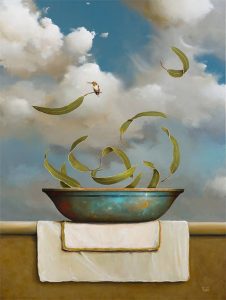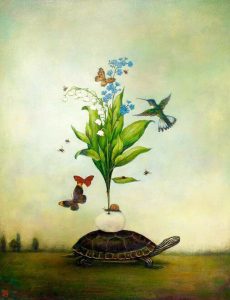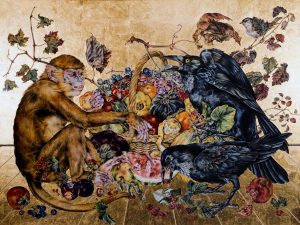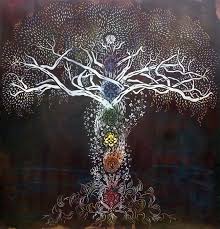 The Yogabliss, Your Heart Life on-line Moving into Meditation classes met this morning. We explored the practice of equanimity as a way of accepting the human condition. It involves feeling the feelings we’d rather turn away from. We began by exploring the qualities of awareness and our ability to narrow and widen our view. We practiced meeting challenging mind states with intimacy and also from the perspective of caring witness.
The Yogabliss, Your Heart Life on-line Moving into Meditation classes met this morning. We explored the practice of equanimity as a way of accepting the human condition. It involves feeling the feelings we’d rather turn away from. We began by exploring the qualities of awareness and our ability to narrow and widen our view. We practiced meeting challenging mind states with intimacy and also from the perspective of caring witness.
Today’s practice was informed by Ajahn Sucitto’s book, Parami, Ways to Cross Life’s Floods. The book outlines ten life affirming practices of: Generosity, Morality, Renunciation, Discernment, Energy, Patience, Truthfulness, Resolve, Kindness, Equanimity.
 We heard from Zen Master Thich Nhat Hanh’s book Living Buddha, Living Christ. This book explores the shared spiritual values of Buddhism and Christianity. Thich Nhat Hanh encouraged readers to appreciate their spiritual traditions while sharing inspiration to live with compassion. He posed penetrating questions about the true meaning of peace.
We heard from Zen Master Thich Nhat Hanh’s book Living Buddha, Living Christ. This book explores the shared spiritual values of Buddhism and Christianity. Thich Nhat Hanh encouraged readers to appreciate their spiritual traditions while sharing inspiration to live with compassion. He posed penetrating questions about the true meaning of peace.
We drew from Ruth King’s book, Mindful of Race. Ruth is a meditation teacher and racial justice activist. Her Mindful of Race Training Program weaves mindfulness practice with an exploration of our racial conditioning, its impact, and our potential. Her teaching helps make the direct experience of equanimity accessible at times when we need it most.
We heard William Yellow Robe’s poem, Breathe Deeper. William was an actor, author, director, educator, playwright, and poet. He authored over 45 plays centering the Native American experience. He was a citizen of the Fort Peck Assiniboine and Sioux Tribes, until his death on July 19, 2021. Breathe Deeper is a beautiful poem that invites readers to allow the breath to guide us into equanimity.
I invite you to begin settling. See if you can tune into those areas where you feel supported. Let your awareness rest there for a few breaths. What is it like to attune to sensations of support? How do these sensations touch you?
Let your awareness broaden to explore how sensations may change, become stronger or begin to fade.
I invite you to feel breathing in a way that you can breathe with ease. If becoming aware of the breath raises anxiety you can attune to sound. See if you can focus on something that fosters a sense of ease. Notice what begins to surface in awareness. Sensation. Feeling. Thought. Images. Memories. Plans. Can you let your awareness broaden to be with this experience and still feel breathing or your chosen focus area? You can explore how awareness can hold something that’s changing while also holding something that is steady.
 Exploring the qualities of awareness itself is a capacity that enables one to observe, to witness. If you feel yourself being carried away, you can come back to that place that’s steady. Once again you can notice what begins to surface. You might note: “Yes, Sensation. Yes, Feeling. Yes, Thought. Yes, Images. Yes, Memories. Yes, Plans, Yes People.” These mind states are accompanied by feeling qualities. What are you feeling? Is there a sense of Constriction? Separation? Suffering? Compassion? Happiness? Peace?
Exploring the qualities of awareness itself is a capacity that enables one to observe, to witness. If you feel yourself being carried away, you can come back to that place that’s steady. Once again you can notice what begins to surface. You might note: “Yes, Sensation. Yes, Feeling. Yes, Thought. Yes, Images. Yes, Memories. Yes, Plans, Yes People.” These mind states are accompanied by feeling qualities. What are you feeling? Is there a sense of Constriction? Separation? Suffering? Compassion? Happiness? Peace?
So often these experiences are like energetic knots that become tighter with our wanting things to be a certain way. The more we struggle the more entangled we become. The invitation is – just for the moment – to let go of the struggle. Just for the moment, agree to come back to center. It might feel like the moment of finding balance standing on one leg. You find the Stillpoint. In the Stillpoint, the discerning witness can establish equanimity.
This is the practice of peace and peacemaking. How we need this practice now as we feel the anguish, concern and fear for what is happening in Ukraine. Zen master Thich Nhat Hanh wrote:
 We often think of peace as the absence of war, that if powerful countries would reduce their weapon arsenals, we could have peace. But if we look deeply into the weapons, we see our own minds—our own prejudices, fears, and ignorance. Even if we transport all the bombs to the moon, the roots of war and the roots of bombs are still there, in our hearts and minds, and sooner or later we will make new bombs. To work for peace is to uproot war from ourselves and from the hearts of men and women.
We often think of peace as the absence of war, that if powerful countries would reduce their weapon arsenals, we could have peace. But if we look deeply into the weapons, we see our own minds—our own prejudices, fears, and ignorance. Even if we transport all the bombs to the moon, the roots of war and the roots of bombs are still there, in our hearts and minds, and sooner or later we will make new bombs. To work for peace is to uproot war from ourselves and from the hearts of men and women.
In the practice of equanimity we can recognize mind states for what they are. Our understanding defuses their power when we meet them with compassion. Even when it feels as though we are flooded with emotion, we can trust it will change. Ajahn Sucitto writes that “it is through feeling the feelings and letting them move through you that you get a chance to develop and know the value of equanimity.” I invite you to think about equanimity as self acceptance. This may lead to an “even minded acceptance” you can extend to others.
Meditation teacher and racial justice activist, Ruth King, reminds us that we . . . “can orient the heart. . . simply by bringing to mind intentions of equanimity.” She offers these motivating phrases:
 May I bear witness to things just as they are.
May I bear witness to things just as they are.
May I remain peaceful and let go of fixation.
May I find the inner resources to genuinely contribute where needed.
May I see the world with quiet eyes.
Once again I invite you to sense those areas where Earth’s Body is supporting your Body. Can you release the weight of your body in your own time? I invite you to tune into those areas where you feel grounded. Begin to explore elemental being. Equanimity is like an elemental force. Perhaps you can draw on the elemental forces of Earth, Water, Fire and Air to help you establish equanimity. You can reflect on the Earth qualities of solidity and timelessness; how Water flows, transforms, reflects and is still; Fire’s energy and heat, its transmuting force; how Air offers a vast spaciousness; how the breath that sustains you, other humans and more-than-humans. Are there qualities that can help you establish a sense of even-mindedness?
Ruth King reminds us that with the powerful intention of equanimity:
 . . . we see beyond judgment and self-interest and realize that we are choosing instead of reacting . . . while the mind is still, steady and clear; those times we make small choices that show great care. . . . equanimity is awareness so spacious that whatever arises in our mind and heart, whether agreeable or disagreeable, is small and incidental compared to awareness itself. In other words, when we are equanimous, nothing is left out of heart’s view.
. . . we see beyond judgment and self-interest and realize that we are choosing instead of reacting . . . while the mind is still, steady and clear; those times we make small choices that show great care. . . . equanimity is awareness so spacious that whatever arises in our mind and heart, whether agreeable or disagreeable, is small and incidental compared to awareness itself. In other words, when we are equanimous, nothing is left out of heart’s view.
May our practice help us to see beyond judgment. May it lead us to choices of great caring. May our awareness be spacious enough to bear witness to the great pain and suffering in Ukraine.
And now Breathe Deeper, a poem by William Yellow Robe
Just but a moment, brother,
sister,
a moment,
a small breath,
less than a splinter of a fear, less than a moment of hate,
that breath,
that courage,
rushing into you,
feel it,
enjoy it,
 now,
now,
breathe deeper,
slowly,
not out of panic,
but with the motion, of a mother,
your eyes dropping fear from you in tears, clearing and seeing truth,
the reality that is yours,
the reality you can change,
discard the hate and fear others refuse to own, replace it with this breath,
your own heart beat,
and begin,
change is not an end, but a moment,
to create life,
create yours…

